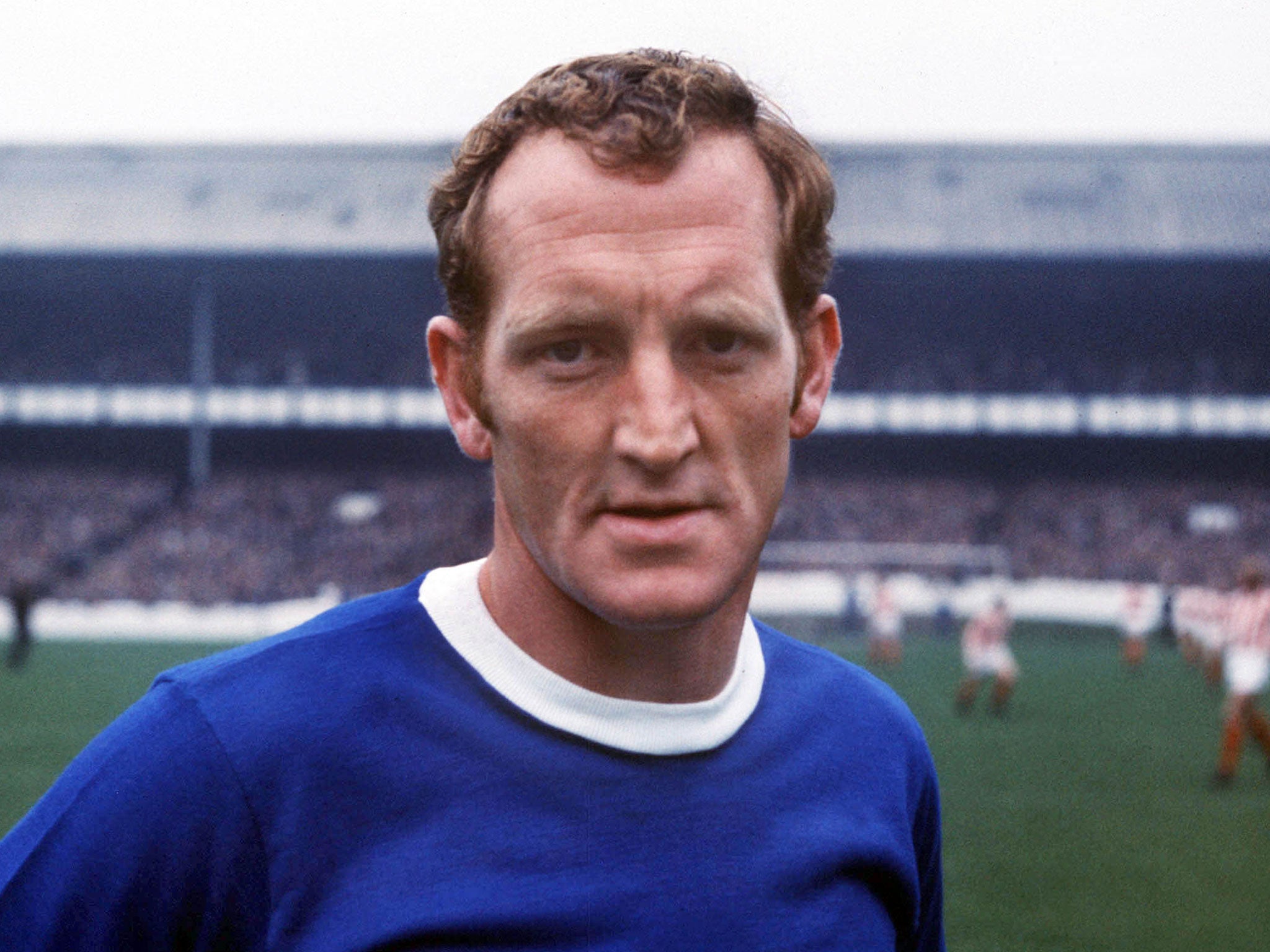Sandy Brown obituary: Everton defender known for his rugged commitment – and a memorable own goal in the Merseyside derby

Sandy Brown played his football with a dash of piratical relish which, along with his honest effort, endeared him to Everton fans of the 1960s.
Goodison Park regulars understood perfectly well that the rugged Scot was all about formidable strength and ferocious commitment, that he had no pretensions to artistry as exhibited, say, by his visionary countryman and Toffees team-mate Alex Young – but they honoured him enthusiastically for his yeoman attributes.
It helped, too, that Brown, who never quite nailed down a regular long-term place, but made more than 250 appearances during nearly eight years at the club, missed only a handful of games as Everton won the title in 1969-70 – and that although he was a specialist left-back, he was so versatile that he featured in every position, including goalkeeper when customary net-minder Gordon West was injured.
And then there was the own goal which truly cemented his cult status. Visiting Liverpool were already one up early in the second half of the Merseyside derby in December 1969 when their England winger Peter Thompson hared down the left touchline and delivered what looked likely to be a harmless cross into the Everton penalty area. But Brown hadn’t read that particular script. Sprinting into the centre of the six-yard box, he launched himself into a spectacular diving header, aiming to clear the ball for a corner, only for the hurtling leather to nestle a foot inside the bemused West’s near goalpost, the prostrate defender eventually joining it in the net. As television commentator David Coleman put it: “Sandy Brown... he must wish the ground could open up!”
Harry Catterick’s lovely, free-flowing side, starring the multi- talented midfield trio of Alan Ball, Howard Kendall and Colin Harvey, suffered an infuriating 0-3 reverse that day, but they had the last laugh in the spring when they were crowned as champions.
Brown began his career with Partick Thistle, making his senior entrance as an 18-year-old in 1957, and in 1962-63 his seven goals were key to the Jags’ third-place finish in the Scottish top flight.
Having enjoyed more than a century of outings for the Firhill club, he was transferred to Everton for £38,000 in September 1963 and soon impressed on both defensive flanks.
Superbly athletic, tough and fiery in true redhead tradition, he was a central figure in the infamous “Battle of Goodison” against Leeds in November 1964, when he was dismissed for punching United play-maker Johnny Giles before tempers raged so tumultuously, on both the pitch and the terraces, that the referee led the teams to the dressing rooms for a cooling-off period before the action resumed.
Sometimes panned for his unsophisticated reading of the game, Brown worked hard to improve that aspect of his play, so successfully that Catterick sometimes deployed him as a shield in front of the back four, typically when facing West Ham, as he was adept at cutting off passes to Geoff Hurst and Martin Peters.
He could be useful, too, as an emergency spearhead, notably when he supplied the winner at home to Real Zaragoza in the European Cup Winners’ Cup in November 1966 – the Spaniards triumphed on aggregate – and he also nodded a fine goal in a 3-1 home victory over Liverpool some three months earlier.
With Tommy Wright and Ray Wilson such a splendid full-back pairing, Brown was omitted from the FA Cup final triumph over Sheffield Wednesday in 1966, despite playing four times on the way to Wembley – memorably against Manchester City in the last eight and Manchester United in the semi-final – but his title glory four years later offered rich compensation.
That term, with the veteran Wilson having departed, he forged an effective partnership with Wright, but in 1970-71 he was squeezed out by the classier Keith Newton and, with Catterick seeking to revitalise his championship-winning combination, Brown joined third-tier Shrewsbury Town that May. He spent one mid-table campaign at Gay Meadow before dropping a division when he was recruited by Southport in July 1972.
Though his service to the Sandgrounders was limited by injuries, Brown played 19 times and qualified for a Fourth Division championship medal that term, a fitting way for the battle-scarred warrior to complete his professional days at the age of 33.
Off the pitch, he was a popular character who invariably accepted with good grace the joking of team-mates, often tickled by his broad Scottish accent. Sandy Brown was never less than a great sport, and often he had proved a good deal more.
Ivan Ponting
Alexander Dewar Brown, footballer: born Grangemouth, Stirlingshire 24 March 1939; played for Partick Thistle 1957-63, Everton 1963-71, Shrewsbury Town 1971-72, Southport 1972-73; died Blackpool 8 April 2014.
Subscribe to Independent Premium to bookmark this article
Want to bookmark your favourite articles and stories to read or reference later? Start your Independent Premium subscription today.

Join our commenting forum
Join thought-provoking conversations, follow other Independent readers and see their replies